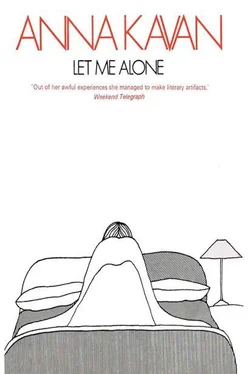‘Don’t go!’ she said impulsively, stretching out her hand.
Like a materialization, the hand of Sidney moved out of the darkness and took Anna’s in a firm, cool grip.
‘Feeling sentimental?’ The low, masculine voice was rough with tenderness, and a heavy sadness under the mockery.
Anna gave an unhappy murmur, and said:
‘It’s rather beastly, isn’t it? Having to go away like this.’
‘Damnable!’ said Sidney, her hard fingers tightening about Anna’s hand.
Anna felt tired and unreal. A deep, indefinable uneasiness stirred in her like a foreboding. Sidney seemed to have become remote, the clasp of her hand was chilly and detached as a spectral grip; there was no longer any comfort in it.
‘I feel worried,’ she said. ‘I don’t know why. As if something horrible were going to happen.’ Her face was a troubled blur in the dimness.
‘What could happen?’ Sidney said. ‘Things aren’t so bad really. It will be pleasant for you to have a lazy summer at home. You like your aunt, don’t you?’
‘I don’t dislike her,’ Anna replied. ‘But somehow she’s not quite a real person. One can’t talk to her at all. She’s too —’ she paused a moment, searching her mind for the descriptive word, ‘— too papilionaceous!’ she ended, with a faint smile.
A slow answering smile of complete understanding glimmered on Sidney’s face.
‘I know what you mean, exactly,’ she said.
There was silence for a moment. Then she began to draw away.
‘We will meet again soon, won’t we?’ said Anna urgently. She still felt uneasy and exhausted, very anxious for some reassurance.
‘Yes, of course,’ came Sidney’s voice, like a ghost out of the darkness.
The amber eyes looked down at Anna, with a passionate flame of devotion hidden in the dark, and an intuitive, courageous, unfailing sympathy.
Anna lay in bed sadly after Sidney had gone, seeing in imagination the clear, bright eyes of her friend, full of love and encouragement, like the faithful eyes of a very intelligent, very sensitive dog. But it was not quite the encouragement that she wanted, really. She felt uneasy, apprehensive.
The next day Sidney appeared at the station to see her off, very calm, very breezy, hiding her emotion in her odd, brusque, sardonic way.
‘Good-bye,’ she said casually, putting her cool, sunburned hand in Anna’s, through the open window of the carriage.
‘Good-bye,’ Anna replied.
She felt curiously unreal, indifferent almost. She had slept badly. In the night, a breath of fear had blown upon her from the inimical dark; the striking quarters of the hours had beaten in her ears with a vague clash of menace. So that now she scarcely realized what was going on.
Sidney looked her full in the eyes.
‘Write often,’ she said, in her aggressive, domineering voice that covered a note of wistfulness.
‘Yes,’ said Anna.
‘Well —’ Sidney checked herself with a queer impatience, and walked stiffly away.
As the train moved out of the station, Anna caught sight of Catherine, smiling good-bye and looking at her very definitely with a peculiar forced significance in her big, dark, handsome eyes, as though she intended to convey some message. Anna did not know what she meant by the look, only a significant intensity seemed centred in her, compelling attention. Rachel did not say good-bye to Anna at all.
BLUE HILLS, the home of Lauretta and Heyward Bland, was a small, beautifully-kept-up estate near Wycombe. From the road one could see a flattish stretch of park-land, and then the house on a little knoll, appearing through the tall bulk of the elms. It was a white two-storey house with a sweep of gravel for carriages, and a careful flower garden between it and the park. Among the trees, away from the house, some sheep were usually grazing.
Anna did not feel at home there. She had not spent much time at Blue Hills. Lauretta always travelled a good deal, and Anna’s holidays had been passed in different places. Up till the end of the war the house had been a convalescent home for officers, and Anna, on her visits there, had always felt herself to be an outsider, outside the life of the place. She had kept well in the background.
Now, for the first time, it became real to her. Freed from the transient war-time atmosphere of slightly artificial busy-ness, its own individual atmosphere, the proper spirit of the place itself began to emerge.
Heyward Bland was now living at home, returned from his patriotic labours at the War Office.
The Colonel was a lean, spruce, elderly man, with a rather fierce expression, and a bald, longish head. His manner was didactic and irritable and overbearing, except towards Lauretta to whom he was always politely attentive. But he had a genial, patronizing way of talking to inferiors that made him popular with old-style members of the lower classes: with the younger people it did not go down very well.
Anna understood him thoroughly, and was a little contemptuous. Heyward Bland was conceited and pompous like a scraggy old cockerel, and with the same bullying stupidity. She felt she had never met anyone so entirely imperceptive. But he wasn’t a bad old stick, really. According to his lights, inside his own narrow limitations, he was a good man and wanted to do his duty, as he conceived it. He even wanted to be amiable and strictly fair towards Anna, whom he disliked.
Anna knew at once that he disliked her, and that he disliked all young people. He had a profound suspicion of youth. As though the young people of the world were secretly in league against him, to make him appear ridiculous. And he hated everything to which the word ‘modern’ could possibly be applied.
But Lauretta kept him in his place. She had very decidedly got the upper hand in spite of the Colonel’s barn-yard, male domineeringness. He was rather muted in her proximity, rather subdued, his fierce expression turned a little foolish, his eyes anxiously on the watch. His whole cocksureness slightly gone off, like milk that is just beginning to turn sour on a thundery day. It was rather pathetic to see him so diminished. But once outside the sphere of Lauretta’s sedative influence he perked up again at once, fluffed out his feathers, and strutted off, crowing shrilly again.
Anna was worried as to how Lauretta would take her expulsion. She did not know what Rachel Fielding had written to her aunt. So she was nervous when Lauretta suddenly said to her:
‘I’ve had an extraordinary letter from Rachel. She seems to think you had better not go back to Haddenham for your last term, after all.’
‘She talked to me about it,’ Anna said, rather uneasy.
Lauretta darted a quick glance at her out of her bright, suspicious eyes.
‘But I thought you were so happy there,’ she said, in a surprised voice. ‘Why shouldn’t you go back?’
‘Well, there’s nothing much for me to do, really. I’m simply waiting to go up to Oxford now, you see.’
Lauretta was looking at her shrewdly, summing up the situation. She didn’t particularly want to have Anna at home all the summer. But perhaps it wasn’t a bad thing really. The girl was growing up and she ought to see more of her. Anna had improved lately, too. In appearance she was quite presentable. If only she would pay a little more attention to her clothes she would be even attractive.
‘Yes, I think it’s best that you should be here,’ she said, with the quick, flickering smile that never got beyond the corners of her mouth.
Anna felt that she had been let off lightly: and she saw that Lauretta had experienced a friendly impulse towards her.
‘Yes, we must get to know each other better,’ said Lauretta. ‘Now that you are older, we must be great friends.’
Читать дальше












